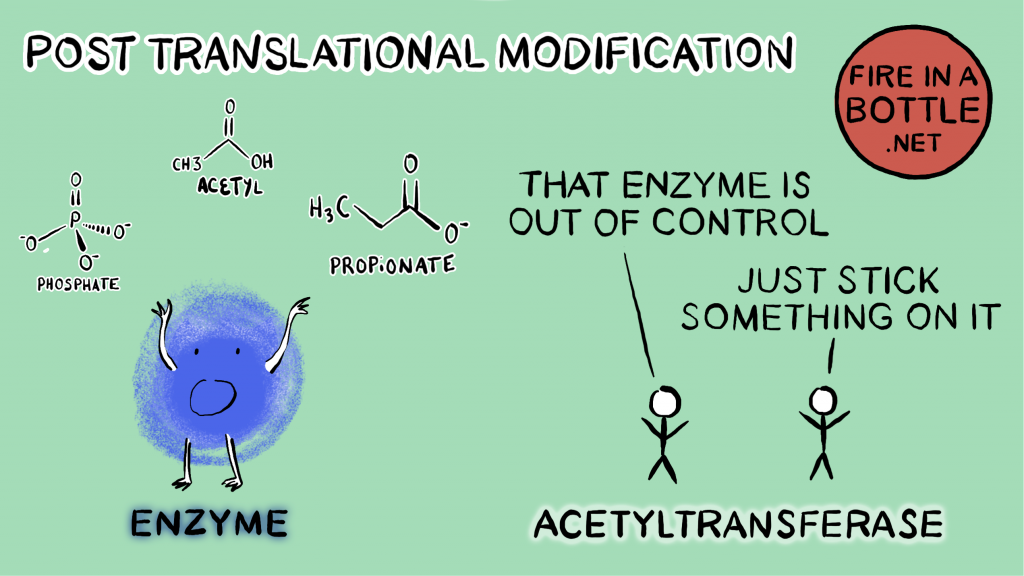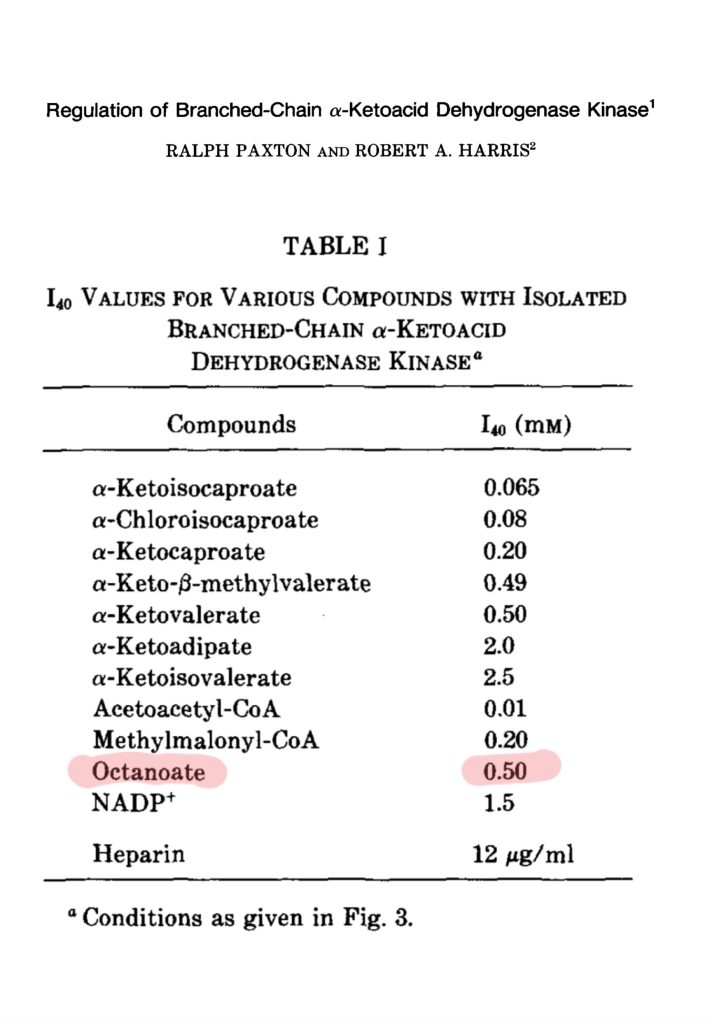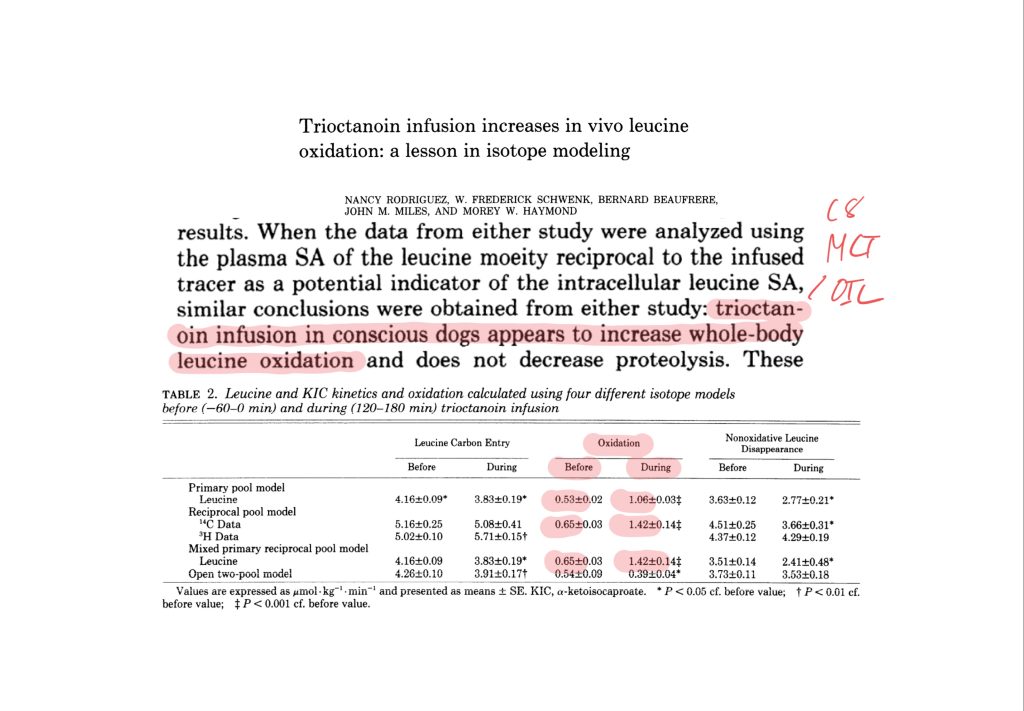MCT oil has long been associated with weight loss. This is especially true of the 8 carbon MCT, caprylic acid. I have yet to see any reasonably definitive reason for why this might be.
I have recently been talking about restriction of branched-chain amino acids (BCAAs: valine, leucine and especially isoleucine) for weight loss.
Obese humans have elevated levels of circulating BCAAs which seem to add to insulin resistance in a causative way. The reason for this is likely decreased activity of the enzyme that catalyzes the limiting step in catabolizing the BCAAs: Branched-chain Ketoacid Dehydrogenase (BCKDH). You like acronyms? The reason that BCKDH levels are low seems to be due to high activity of Branched Chain Ketoacid Dehydrogenase Kinase (BCKDHK). You’re welcome. Some people just call this BDK, but they are lazy at typing.
As the name implies, BCKDHK is a kinase which means that it sticks phosphate groups onto things. Sticking phosphate groups onto enzymes can either turn them on or off. It depends. BCKDH is turned OFF when a phosphate group is stuck onto it by BCKDHK. Got it?
This type of protein modification is known as “post-translational modification”. When mRNA is turned into a protein (which is a strand of amino acids), it is called translation. The post-translational modifications happen after. I have a graphic for this. Just sub the word “kinase” for acetyltransferase.

C8 MCT Oil Inhibits BCKDHK
It has been known since the dawn of time that BCKDH is the limiting step in breaking down BCAAs. I was poking around in some old studies about the regulation of BCKDHK and this jumped out at me. The paper is from 1984, the same year Van Halen released their album 1984 with David Lee Roth as the frontman.

Octanoate is another name for C8 MCT oil. If this table is correct, it suggests that C8 MCT oil blocks the thing that blocks the catabolism of BCAAs. Which is to say that consuming MCT oil might help you to break down BCAAs. Perhaps this is the reason people have found success with MCT oil.
This is intriguing, but is it biologically relevant? In 1986 it was reported that ocanoate (C8 MCT oil) doubled the rate of leucine oxidation when it was infused into dogs. This was the equivalent of 70g of pure C8 MCT oil infused into a 165 lb human over three hours. That’s a lot, but it certainly puts it into the range of biological relevance.

Is This The Magic of C8 MCT Oil?
It’s possible. Reducing circulating BCAAs would help to increase insulin sensitivity. Furthermore, BCKDH is a major producer of ROS and is thus thermogenic.
It’s impossible to know at this moment, but I’m considering making some C8 MCT oil vinagrette.
De Bandt, Jean-Pascal, Xavier Coumoul, and Robert Barouki. “Branched-Chain Amino Acids and Insulin Resistance, from Protein Supply to Diet-Induced Obesity.” Nutrients 15, no. 1 (December 23, 2022): 68. https://doi.org/10.3390/nu15010068.
Felig, Philip, Errol Marliss, and George F. Cahill. “Plasma Amino Acid Levels and Insulin Secretion in Obesity.” New England Journal of Medicine 281, no. 15 (October 9, 1969): 811–16. https://doi.org/10.1056/NEJM196910092811503.
Paxton, Ralph, and Robert A. Harris. “Regulation of Branched-Chain α-Ketoacid Dehydrogenase Kinase.” Archives of Biochemistry and Biophysics 231, no. 1 (1984): 48–57. https://doi.org/10.1016/0003-9861(84)90361-8.
Quinlan, Casey L., Renata L.S. Goncalves, Martin Hey-Mogensen, Nagendra Yadava, Victoria I. Bunik, and Martin D. Brand. “The 2-Oxoacid Dehydrogenase Complexes in Mitochondria Can Produce Superoxide/Hydrogen Peroxide at Much Higher Rates Than Complex I.” Journal of Biological Chemistry 289, no. 12 (2014): 8312–25. https://doi.org/10.1074/jbc.M113.545301.
Rodriguez, N., W. F. Schwenk, B. Beaufrere, J. M. Miles, and M. W. Haymond. “Trioctanoin Infusion Increases in Vivo Leucine Oxidation: A Lesson in Isotope Modeling.” American Journal of Physiology-Endocrinology and Metabolism 251, no. 3 (September 1, 1986): E343–48. https://doi.org/10.1152/ajpendo.1986.251.3.E343.
